
The World Scout Jamboree is a Scouting jamboree of the World Organization of the Scout Movement, typically attended by several tens of thousands of Scouts from around the world, aged 14 to 17. At the jamboree, many scouts swap badges.

Junák – český skaut, is the internationally recognized organization of Scouts and Guides of the Czech Republic. Founded in 1911, Junák – český skaut is the largest organisation of children and youth in the nation, with a membership of 73,315.

Latvijas Skautu un Gaidu Centrālā Organizācija is the primary national Scouting and Guiding organisation of Latvia and a member of both the World Association of Girl Guides and Girl Scouts and the World Organization of the Scout Movement. The organization had 759 members as of 2011. Scouting activities began in Latvia in 1917 when the area was still part of the Russian Empire. After independence in 1918, the national organization was established and Scouting thrived in Latvia in the 1920s-1930s. Upon the Soviet occupation of Latvia in 1940, Scouting was suppressed and not re-established until 1990, when Latvia regained its independence.

The National Scout jamboree is a gathering, or jamboree, of thousands of members of the Boy Scouts of America, usually held every four years and organized by the National Council of the Boy Scouts of America. Referred to as "the Jamboree", "Jambo", or NSJ, Scouts from all over the nation and world have the opportunity to attend. There is also an event called World Scout Jamboree which is the same concept but instead of national it is international" They are considered to be one of several unique experiences that the Boy Scouts of America offers. The first jamboree was scheduled to be held in 1935 in Washington, D.C. to celebrate the 25th anniversary of Scouting, but was delayed two years after being cancelled due to a polio outbreak. The 1937 jamboree in Washington attracted 25,000 Scouts, who camped around the Washington Monument and Tidal Basin. The event was covered extensively by national media and attended by President Franklin D. Roosevelt.

The Fédération du Scoutisme Français is an umbrella organization that combines the efforts of the several Scouting and Guiding associations in France and also represents the Scouting movement in French Guiana, Martinique, Saint-Pierre and Miquelon, New Caledonia, Réunion, Wallis and Futuna and Guadeloupe. Until 2012 the Muslim Scouts of France were presiding the Federation with Dr. Younès F. Aberkane as president.
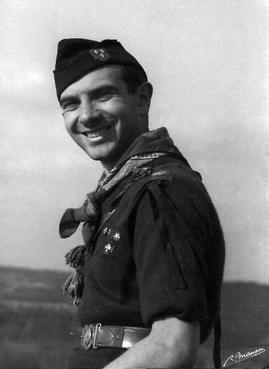
Pierre Joubert was a French illustrator and comics artist. He was closely associated with the creation of Scouting and the popular look of Boy Scouts in France and Belgium, comparable to the American artist Norman Rockwell.

In Scouting, a jamboree is a large gathering of Scouts and/or Girl Guides who rally at a national or international level.

Estonian Scout Association is the primary national Scouting organization of Estonia, became a member of the World Organization of the Scout Movement in 1996. The coeducational Eesti Skautide Ühing has 1,337 members as of 2011.

Magyar Cserkészszövetség, the primary national Scouting organization of Hungary, was founded in 1912, and became a member of the World Organization of the Scout Movement in 1922 and again after the rebirth of Scouting in the country in 1990. The coeducational Magyar Cserkészszövetség had 12,937 members in 2021.

The Scout Association of Japan is the major Scouting organization of Japan. Starting with boys only, the organization was known as Boy Scouts of Japan from 1922 to 1971, and as Boy Scouts of Nippon from 1971 to 1995, when it became coeducational in all sections, leading to neutral naming. Scouting activity decreased radically during World War II but slowly recovered; membership at the end of May 2017 was 99,779.
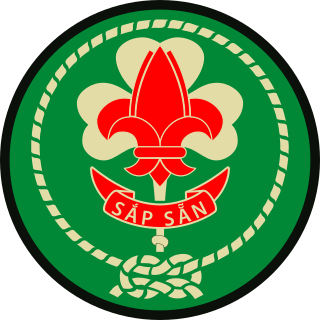
The Vietnamese Scout Association is a youth organization that was established in Vietnam and active between 1930 and 1975. The association was recognized by the World Organization of the Scout Movement from 1957 to 1975.

The Plast National Scout Organization of Ukraine, commonly called Ukrainian Plast or simply Plast, is the largest Scouting organization in Ukraine.
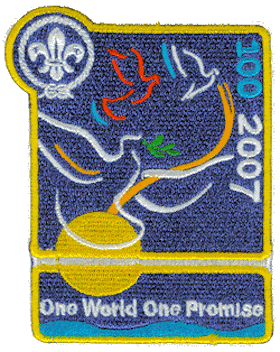
The Scouting 2007 Centenary comprised celebrations around the world in which Scouts celebrated 100 years of the world Scout movement. The original celebrations were focused on the United Kingdom, such as the camp on Brownsea Island, the birthplace of Scouting, and the 21st World Scout Jamboree in Chelmsford, Essex.
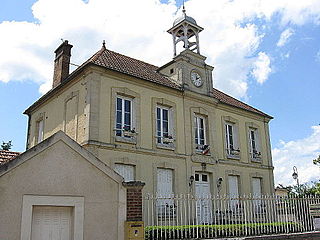
Moisson is a commune in the Yvelines department in the Île-de-France region in north-central France.
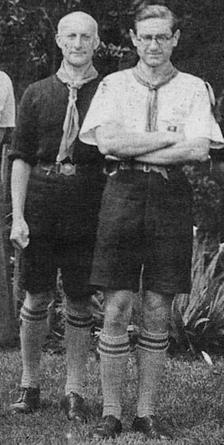
Raymond Schlemmer was a seminal figure in the early history of Scouting in France, from 1922 to 1952.
Scouting has been active in displaced persons camps and in the lives of refugees since World War I. During and after World War II, until the early 1950s, Scouting and Guiding flourished in these camps. These Scout and Girl Guide groups often provided postal delivery and other basic services in displaced persons camps. This working system was duplicated dozens of times around the world. In the present, Scouting and Guiding once again provide services and relief in camps throughout war-torn Africa.
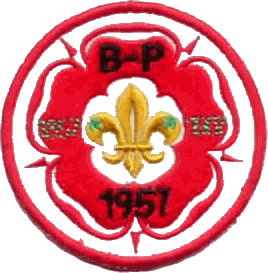
The 9th World Scout Jamboree, also known as the Jubilee Jamboree, was held at Sutton Park, Royal Town of Sutton Coldfield, Warwickshire, England, for twelve days during August 1957. The Jamboree marked dual milestones as it was both the 50th anniversary of the Scouting movement since its inception at Brownsea Island and the 100th anniversary of the birth of Scouting's founder Robert Baden-Powell.

The 7th World Scout Jamboree was held from 3 to 12 August 1951, and was hosted by Austria at Bad Ischl in Upper Austria. The attendance was 12,884 from 61 different parts of the world, with 675 German Scouts given a warm welcome as official participants in a World Jamboree for the first time. The Austrian contingent was slightly outnumbered by the Commonwealth contingent and had reduced the minimum age for their attendees from 14, the normal Jamboree age, to 13, since the revived organization had only been in existence for five years. The 7th World Scout Jamboree was also the last Jamboree for which Austria were the host country.
Various organizations have promoted Scouting activities in the Philippines: the YMCA, the Boy Scouts of America, the Camp Fire Girls, the Boy Scouts of the Philippines, the Girl Scouts of the Philippines, and the Boy Scouts of China.
Giulio Cesare Uccelini was a leading figure in Catholic Scouting in Lombardy and in the Italian resistance movement through the end of World War II.

















